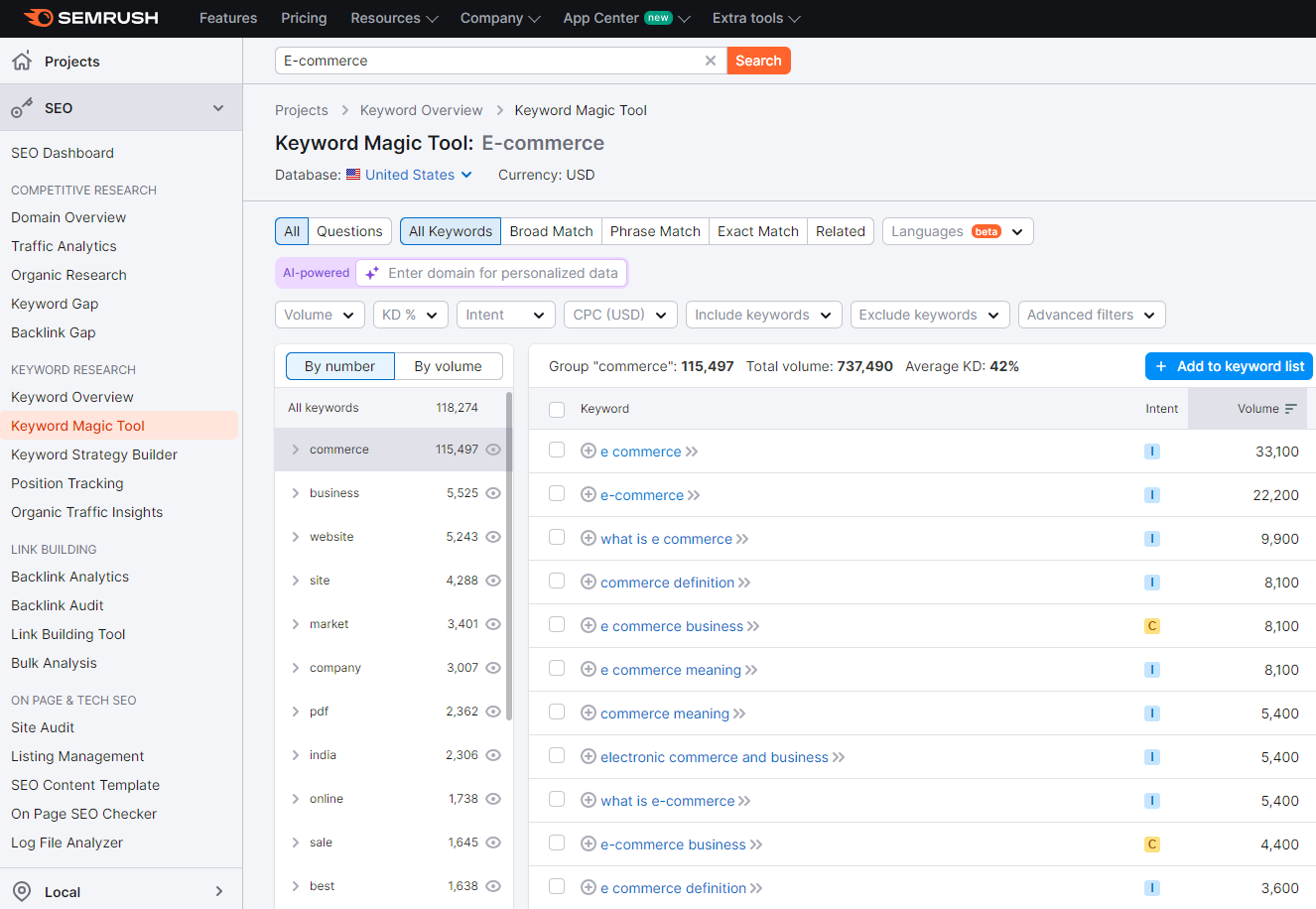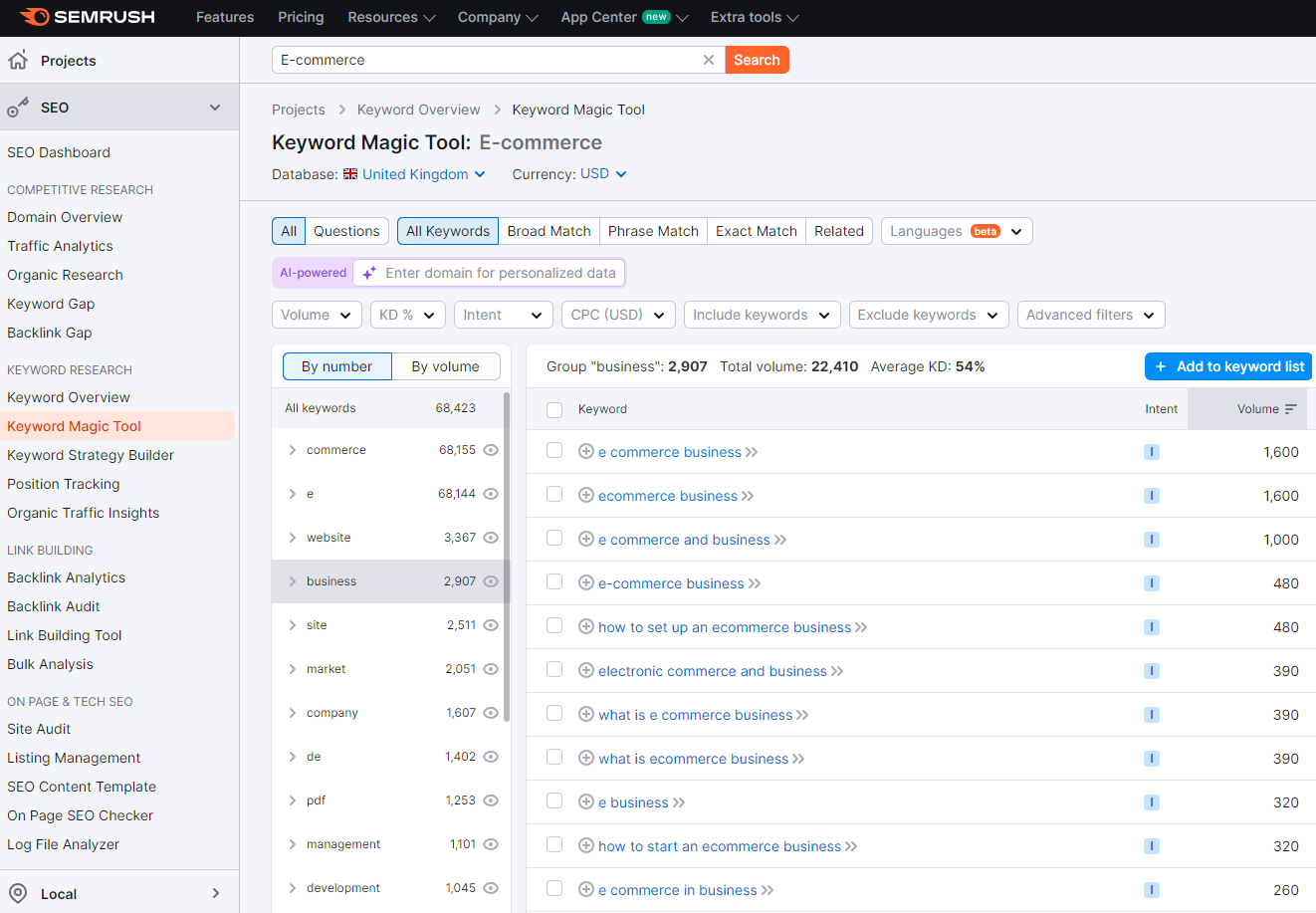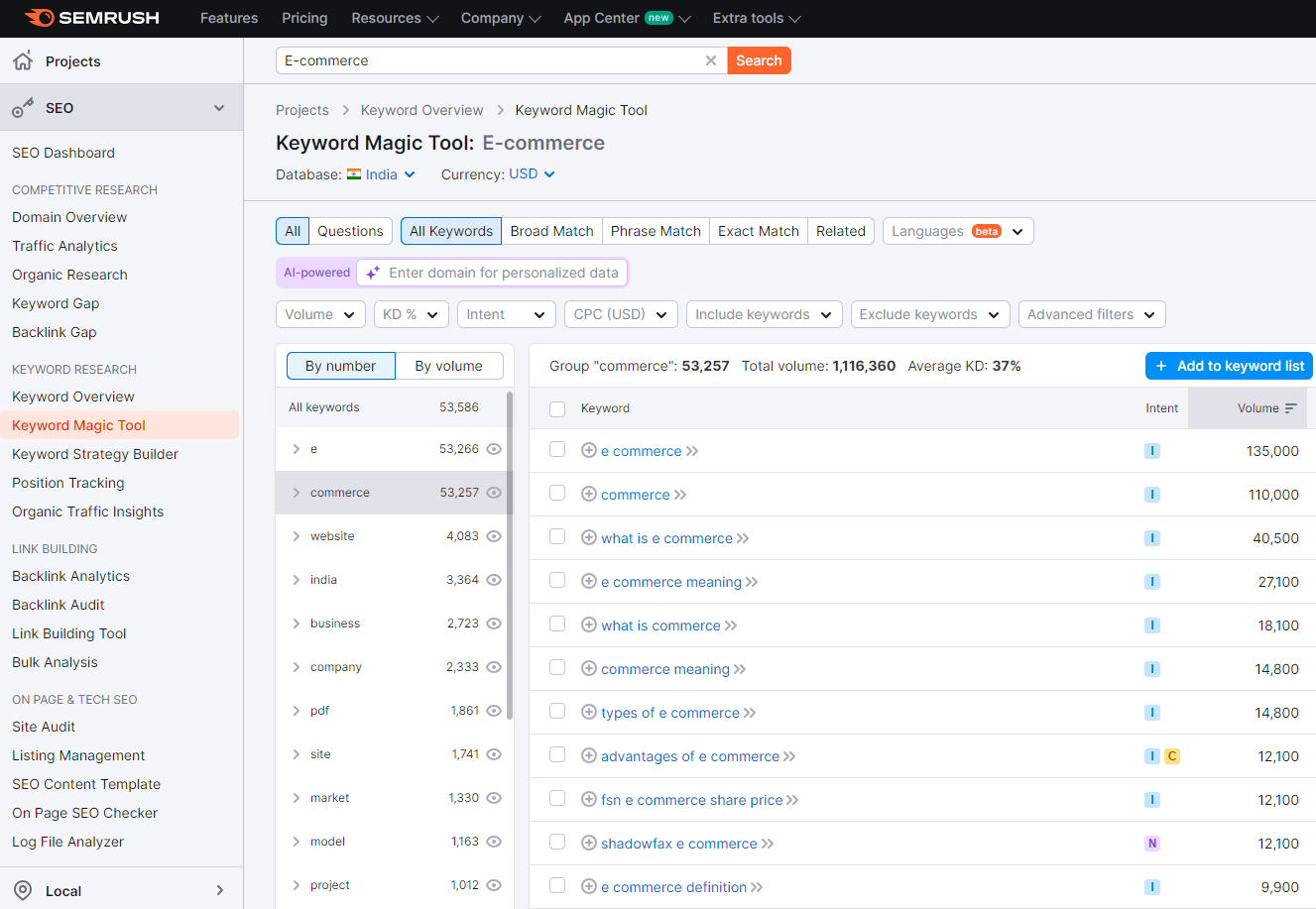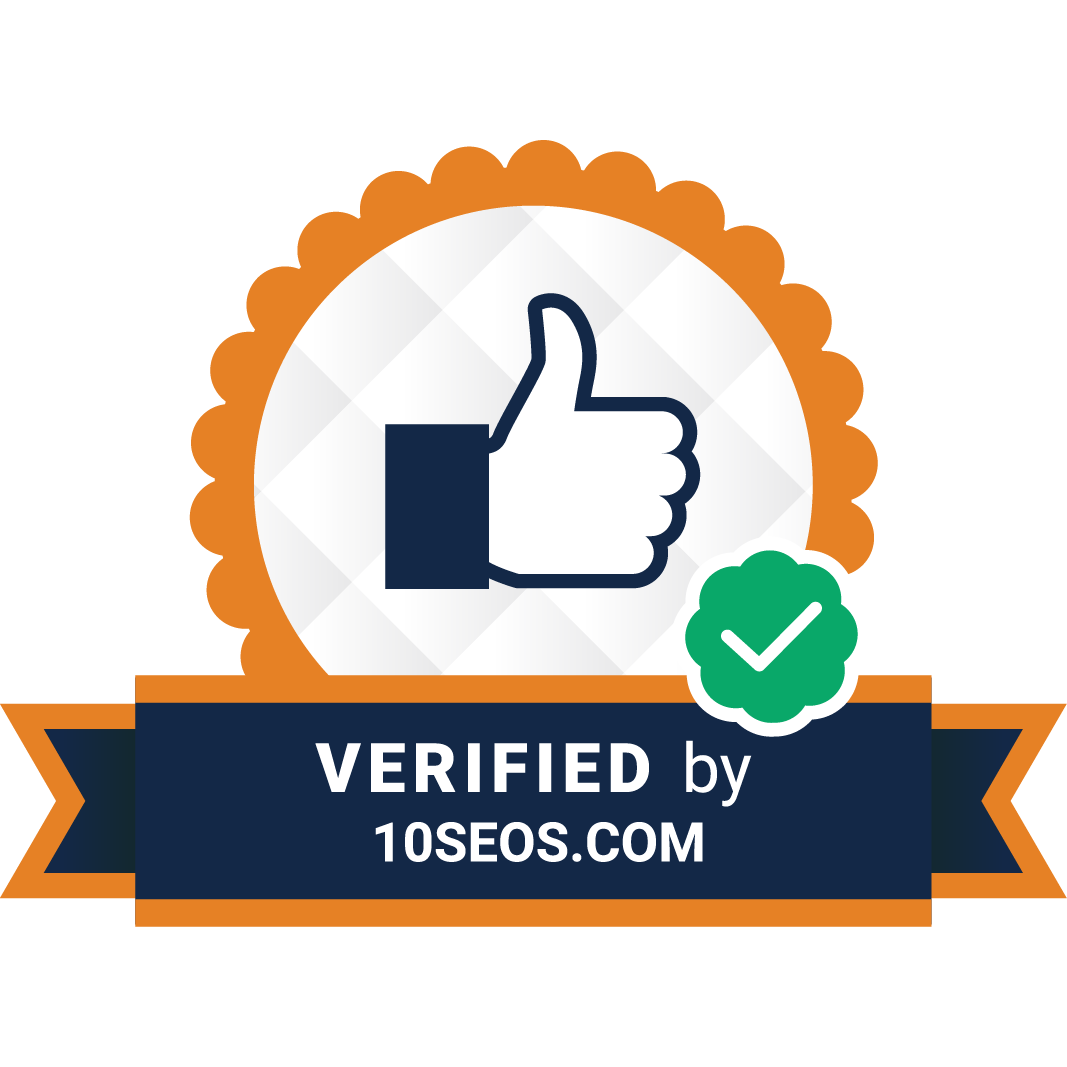Keyword List Updated: 02 September, 2025
Pick the Right Keywords for Your Online Store
In the busy world of online shopping, making your e-commerce store stand out is crucial. One of the most effective ways to do this is by using the right eCommerce SEO keywords.
These powerful words and phrases can help your store rise in the search engine rankings, bringing more potential customers to your virtual doorstep.
Let’s dive into the world of SEO for eCommerce and discover the best keywords for online shopping and ecommerce website that can make a real difference for your online business.
Understanding SEO Keywords in Ecommerce
Keywords play a crucial role in connecting your products with potential buyers. They help search engines understand what your store offers and match it with what shoppers are looking for.
What Are SEO Keywords?
SEO keywords are the words and phrases that people type into search engines when they are looking for information, products, or services online.
For online businesses, these are crucial because they help connect your website with potential customers. Let's break this down further:
The building blocks of online searches
- Keywords act as the foundation of eCommerce keyword strategies by bridging what your store offers with what customers are searching for.
- They are the words people use to ask questions or find things online.
- For example, "best pizza in New York" or "how to fix a leaky faucet."
Your website's connection to the online world
- Keywords act as bridges between what you offer and what people are looking for.
- They help search engines understand what your website is about.
- This understanding allows search engines to show your site to relevant searchers.
The language of your customers
- Keywords reflect how your potential customers think and talk.
- They're the terms people naturally use when describing what they want.
- Understanding these helps you speak your customers' language on your website.
Different types for different purposes
- Informational keywords: are used when people want to learn something.
- Navigational keywords: are used to find a specific website or page.
- Commercial keywords: show an intent to buy or compare products.
- Transactional keywords: used when someone is ready to make a purchase.
Short-tail vs. long-tail keywords
- Short-tail: Broader terms, usually one or two words (e.g., "running shoes".)
- Long-tail: More specific phrases, often three or more words (e.g., "affordable waterproof running shoes for men".)
Long-tail keywords are usually less competitive and more focused on specific needs.
Why Are Keywords Important for Ecommerce?
Keywords play a crucial role in the success of online stores. They are like the secret component that helps customers find your products when they are shopping online. Let's dive into why keywords matter so much for e-commerce:
They Help Customers Find Your Store
- Using the top eCommerce keywords ensures that your store appears in relevant search results.
- When people search for products, your keywords help your store pop up in the results.
- Without an effective eCommerce keyword strategy, your online store might remain invisible to potential customers.
Keywords Bring in Targeted Traffic
- With the right SEO eCommerce keywords, your store can attract qualified leads actively searching for your products or services.
- When someone searches using keywords that match your products, they are more likely to buy.
- Targeting keywords for eCommerce websites, such as “luxury handbags for sale” or “discount electronics,” can help ensure higher conversion rates.
They Improve Your Search Engine Rankings
- Search engines use keywords to understand what your store sells.
- When you use relevant keywords, search engines are more likely to show your store in results.
- Better rankings mean more visibility, which often leads to more sales.
Keywords Help You Understand Your Customers
- By researching popular keywords, you can learn what your potential customers are looking for.
- This insight can help you stock the right products or create better product descriptions.
- It's like having a direct line to your customer's thoughts and needs.
They Make Your Product Descriptions More Effective
- Using the right keywords in your product descriptions helps customers find exactly what they want.
- It also helps search engines understand what you are selling.
- This can lead to more accurate search results and happier customers.
Keywords Can Give You a Competitive Edge
- If you use keywords better than your competitors, you might show up higher in search results.
- This can help you stand out in a crowded market.
- It's like having a louder voice in a noisy room.
They Help With Local Searches
- If you have a physical store or serve specific areas, local keywords are crucial.
- They help nearby customers find you when they're ready to buy.
- This is especially important for searches like "near me" or "in [city name]."
Now that we understand the basics, let's explore the top SEO keywords for e-commerce.
It Targets the Right Traffic
- Not all keywords are created equal. Some might bring in a ton of traffic, but if it's not the right kind of traffic (i.e., people actually looking for plumbing services), it's practically useless.
- Proper keyword research helps you identify the high-value, highly relevant keywords that will attract qualified leads and potential customers who are more likely to convert.
It Gives You a Competitive Edge
- Chances are, you're not the only plumber in town trying to rank for those attractive keywords.
- Keyword research allows you to scope out the competition and see what keywords they're targeting (and which ones they're missing).
- Armed with this knowledge, you can craft a smarter strategy and go after the keywords that will give you the biggest value for your investment in SEO.
It Keeps You Up-to-Date
- The world of SEO is constantly evolving, and the keywords that worked like a charm last year may not be as effective today.
- Regular keyword research helps you stay on top of the latest trends, ensuring that your website is optimized for the keywords people are searching for right now.
- Create shareable and valuable content that other websites want to link to, improving your site's authority and rankings.
Top Categories of Ecommerce Keywords
Product-Specific Keywords
One of the most important categories of keywords for any online store is product-specific terms. Incorporate these into your eCommerce SEO keywords strategy for maximum impact:
- Brand Names: Include popular brand names your store carries. Example: “Nike running shoes.”
- Product Types: Use terms like “home office chairs” or “ergonomic keyboards.”
- Specific Product Names: Focus on long-tail phrases like “affordable leather laptop bags.”
Commercial-Intent Keywords
These keywords signal that a shopper is ready to buy, making them incredibly valuable for e-commerce sites. Using these effectively is a must for your online shopping keywords list.
"Buy" and "For Sale"
Including terms like "buy" or "for sale" in your keywords can attract customers who are ready to make a purchase.
For example, "buy women's running shoes" or "laptops for sale" are phrases that indicate high purchase intent.
"Best" and "Top"
Many shoppers search for the "best" or "top" products in a category. Using these words in your content can attract customers looking for high-quality items.
"Cheap" and "Affordable"
For budget-conscious shoppers, terms like "cheap" or "affordable" can be powerful keywords. However, use these carefully to avoid devaluing your products.
"Discount" and "Sale"
Everyone loves a good deal. Keywords like "discount" and "sale" can attract bargain hunters and impulse buyers.
Seasonal and Trend-Based Keywords
Keeping your keywords current with seasons and trends can give your store a boost at key times of the year.
Holiday-Specific Terms
Include best keywords for eCommerce relevant to holidays and trends like “Christmas gifts under $50” or “trendy fall jackets.”
Seasonal Products
If you sell seasonal items, adjust your keywords accordingly. For example, "summer dresses," "winter coats," or "back-to-school supplies" can help you reach customers at the right time. Keep your eCommerce keywords list updated with seasonal shifts in consumer behavior.
Trending Products
Stay on top of current trends in your industry and include popular items in your keyword strategy. This might mean adding terms like "smart home devices" or "sustainable fashion" to your list.
Long-Tail Keywords
Long-tail keywords are longer, more specific phrases that can help you target niche markets and stand out from competitors.
Detailed Product Descriptions
Instead of just "running shoes," try longer phrases like "lightweight running shoes for marathon training" or "waterproof hiking boots for rough terrain." This approach can help you attract customers looking for specific features or use cases.
Problem-Solving Phrases
Many shoppers look for products that solve specific problems. Keywords like "anti-aging creams for sensitive skin" or "noise-canceling headphones for open offices" can attract these customers by addressing their particular needs.
Navigational-Based Keywords
If you have a physical store or offer local services, don't forget to include location-based keywords.
"Near Me" Searches
Many mobile users search for products "near me." If you have a brick-and-mortar presence, optimizing for these searches can drive both online and in-store traffic. Make sure to include terms like "near me" in your local SEO strategy to attract customers who are nearby and ready to purchase.
City or Region Names
Include the names of cities or regions you serve in your keywords. This can help you appear in local search results. For example, using phrases like "best coffee shop in Seattle" or "plumbing services in Austin" can improve your visibility for local searches and attract customers from those areas.
Informational and Transactional Based Keywords
Informational Keywords
- How to choose an office-wear shirt
- Trousers reviews
- Casual and formal shirt comparisons
- Part dresses features
Transactional Keywords
- Order [product] online
- [Product] free shipping
- [Product] checkout
- [Brand] shopping cart
- Purchase [product]
Top SEO Keywords for Ecommerce Globally
| S. No. | Keywords | Intent | Avg. monthly searches | CPC (USD) |
|---|---|---|---|---|
| 1 | best website builder | Commercial | 27,100 | 12.35 |
| 2 | online store | Informational, Commercial | 14,800 | 2.84 |
| 3 | shopify pricing | Navigational, Transactional | 14,800 | 3.21 |
| 4 | ecommerce business | Informational | 12,100 | 2.66 |
| 5 | what is ecommerce | Informational | 12,100 | 1.80 |
| 6 | ecommerce website | Informational | 9,900 | 5.81 |
| 7 | shopify dropshipping | Informational, Navigational | 8,100 | 3.12 |
| 8 | shopify website | Navigational | 8,100 | 4.81 |
| 9 | ecommerce platform | Informational | 6,600 | 6.41 |
| 10 | online business | Informational | 6,600 | 3.62 |
| 11 | shopify stores | Navigational | 6,600 | 3.79 |
| 12 | ecommerce agency | Informational, Commercial | 5,400 | 14.29 |
| 13 | ecommerce website design | Informational, Commercial | 5,400 | 8.40 |
| 14 | ecommerce marketing | Informational | 4,400 | 7.79 |
| 15 | ecommerce seo agency | Commercial | 4,400 | 16.46 |
| 16 | ecommerce seo services | Commercial | 4,400 | 16.78 |
| 17 | B2B ecommerce | Informational | 3,600 | 8.67 |
| 18 | ecommerce web design | Informational | 3,600 | 8.40 |
| 19 | magento ecommerce | Informational | 3,600 | 7.42 |
| 20 | best ecommerce platform | Commercial | 2,900 | 5.51 |
| 21 | ecommerce store | Informational | 2,900 | 3.94 |
| 22 | ecommerce website builder | Informational | 2,900 | 9.45 |
| 23 | online business for sale | Transactional | 2,900 | 1.21 |
| 24 | online shopping sites | Commercial | 2,900 | 1.64 |
| 25 | shopify online shopping | Informational, Transactional | 2,900 | 3.33 |
| 26 | shopify payments | Navigational | 2,900 | 15.82 |
| 27 | best ecommerce website builder | Commercial | 2,400 | 7.63 |
| 28 | ecommerce development | Informational | 2,400 | 7.82 |
| 29 | ecommerce marketing agency | Commercial | 2,400 | 21.56 |
| 30 | ecommerce services | Informational | 2,400 | 5.00 |
| 31 | ecommerce solutions | Informational, Commercial | 2,400 | 7.42 |
| 32 | how to create my own online store | Informational | 2,400 | 10.87 |
| 33 | how to start an ecommerce business | Informational | 2,400 | 3.03 |
| 34 | ecommerce development company | Informational | 1,900 | 74.74 |
| 35 | ecommerce software | Informational, Commercial | 1,900 | 7.94 |
| 36 | ecommerce web development | Informational | 1,900 | 12.10 |
| 37 | online selling sites | Commercial | 1,900 | 2.11 |
| 38 | what is ecommerce business | Informational | 1,900 | 1.29 |
| 39 | wix ecommerce | Navigational | 1,900 | 4.12 |
| 40 | ecommerce digital marketing agency | Informational, Commercial | 1,600 | 21.32 |
| 41 | ecommerce website development company | Informational, Commercial | 1,600 | 11.42 |
| 42 | wordpress ecommerce | Informational | 1,600 | 8.23 |
| 43 | e-commerce website | Informational | 1,300 | 0.89 |
| 44 | ecommerce development services | Informational, Commercial | 1,300 | 59.09 |
| 45 | ecommerce digital marketing | Informational | 1,000 | 6.55 |
| 46 | ecommerce strategy | Informational | 1,000 | 5.54 |
| 47 | ecommerce web development company | Informational, Commercial | 1,000 | 15.34 |
| 48 | e-commerce websites | Commercial | 720 | 0.23 |
| 49 | types of e-commerce | Informational | 320 | 0.54 |
| 50 | online selling sites | Commercial | 1,900 | 2.11 |
Top SEO Keywords for Ecommerce in the USA
| S. No. | Keywords | Intent | Avg. monthly searches | CPC (USD) |
|---|---|---|---|---|
| 1 | online store | Informational, Commercial | 14,800 | 2.84 |
| 2 | ecommerce business | Informational | 12,100 | 2.66 |
| 3 | what is ecommerce | Informational | 12,100 | 1.80 |
| 4 | ecommerce website | Informational | 9,900 | 5.81 |
| 5 | ecommerce agency | Informational, Commercial | 5,400 | 14.29 |
| 6 | ecommerce platforms | Informational, Commercial | 5,400 | 6.41 |
| 7 | ecommerce marketing | Informational | 4,400 | 7.79 |
| 8 | B2B ecommerce | Informational | 3,600 | 8.67 |
| 9 | best ecommerce platform | Commercial | 2,900 | 5.51 |
| 10 | shopify plus ecommerce agency | Informational, Commercial | 1,000 | 13.47 |
Top SEO Keywords for Ecommerce in the UK
| S. No. | Keywords | Intent | Avg. monthly searches | CPC (USD) |
|---|---|---|---|---|
| 1 | ecommerce | Informational | 12,100 | 2.87 |
| 2 | what is ecommerce | Informational | 3,600 | 0.96 |
| 3 | shopify store | Navigational, Commercial | 2,400 | 2.05 |
| 4 | ecommerce website | Informational | 1,900 | 4.80 |
| 5 | online business | Informational | 1,900 | 2.34 |
| 6 | ecommerce business | Informational | 1,300 | 2.55 |
| 7 | online store | Informational, Transactional | 1,300 | 2.74 |
| 8 | online sales | Transactional | 1,000 | 1.01 |
| 9 | ecommerce platforms | Informational, Commercial | 720 | 5.45 |
| 10 | magento ecommerce | Informational | 720 | 7.96 |
Top SEO Keywords for Ecommerce in India
| S. No. | Keywords | Intent | Avg. monthly searches | CPC (USD) |
|---|---|---|---|---|
| 1 | trends near me | Transactional | 165,000 | 9.70 |
| 2 | online shopping | Informational | 110,000 | 1.76 |
| 3 | online shopping app | Informational | 49,500 | 3.53 |
| 4 | what is e-commerce | Informational | 40,500 | 6.17 |
| 5 | ecommerce website | Informational | 27,100 | 26.45 |
| 6 | online business | Informational, Commercial | 27,100 | 77.59 |
| 7 | e-commerce business | Informational | 18,100 | 34.39 |
| 8 | advantages of e-commerce | Informational | 12,100 | 2.65 |
| 9 | ecommerce website templates | Informational, Commercial | 12,100 | 13.23 |
| 10 | shopify online shopping | Navigational | 4,400 | 12.34 |
Top SEO Keywords for Ecommerce in UAE
| S. No. | Keywords | Intent | Avg. Monthly Searches | CPC (USD) |
|---|---|---|---|---|
| 1 | e-commerce | Informational | 5,400 | 0.81 |
| 2 | ecommerce license dubai | Navigational | 1,600 | 3.79 |
| 3 | e-commerce business | Informational | 590 | 1.18 |
| 4 | ecommerce website | Informational | 590 | 1.50 |
| 5 | what is shopify | Navigational | 480 | 0.63 |
| 6 | ecommerce web design dubai | Commercial | 390 | 9.27 |
| 7 | magento ecommerce | Informational | 240 | 1.77 |
| 8 | ecommerce platforms | Commercial | 160 | 2.02 |
| 9 | ecommerce logo | Informational | 140 | 0.53 |
| 10 | b2b supermarket photos | Informational | 110 | 0.21 |
Latest SEO Tools We Use














Using Keywords Effectively in Your Online Store
To make the most of SEO ecommerce keywords, integrate them naturally across your website:
Make your product titles clear and descriptive
- Include important keywords in your product names.
- Keep titles natural and easy to read.
- For example, "Men’s Casual Sneakers – Lightweight and Durable." is better than just "Men’s Casual Sneakers."
Write helpful product descriptions
- Use keywords naturally throughout your product descriptions.
- Focus on providing useful information to your customers.
- Describe the features, benefits, and uses of the product.
- Incorporate relevant phrases such as “high-quality leather shoes for formal wear.”
Create category pages that make sense
- Use keywords in your category names and descriptions.
- Use headings like “Affordable Electronics for Students” or “Luxury Jewelry Collection.”
- This helps customers find what they want and improves your store's structure.
Don't forget about your homepage
- Include relevant keywords on your homepage.
- Highlight your main product categories or bestsellers.
- But keep it clean and uncluttered; don't overwhelm visitors.
Use keywords in your website's headings
- Headings help structure your content and grab attention.
- Including keywords in headings can boost your SEO.
- But make sure headings still make sense and sound natural.
Create unique content for each product
- Avoid copying and pasting descriptions from manufacturers.
- Write your own content using relevant keywords.
- This sets you apart from other stores and can improve your search rankings.
How Our SEO services Can Help Ecommerce Websites
Our expert team specializes in optimizing websites for keywords for online businesses. Here's how we can assist:
Local SEO Strategies for E-commerce
We utilize a range of strategies, including optimizing your Google My Business listing, creating local citations, and targeting location-based keywords.
By doing so, we help your e-commerce company rank higher in local search results.
Targeted Keyword Optimization
We conduct in-depth keyword research to identify the most relevant and high-traffic keywords for e-commerce. We identify the best keywords for online shopping to enhance your site's search engine visibility. We help improve your search engine rankings and drive more organic traffic to your site. Our specialized SEO packages for e-commerce are designed to include comprehensive keyword research, ensuring your online store ranks for high-converting search terms.
Content Marketing for E-commerce
Our content marketing team of experienced content creators develops engaging and informative content that resonates with your target audience.
From blog posts and articles to social media updates and videos, we create compelling content that attracts visitors to your site.
Social Media Integration
Our eCommerce SEO services include social media integration, where we create and optimize your social media profiles, post engaging content, and interact with your followers. This helps increase your online visibility and drive more traffic to your website.
The Power of the Right Keywords
In the competitive world of ecommerce, the right ecommerce keywords can make a significant difference in your store's visibility and success. By understanding and effectively using product-specific keywords, purchase-intent phrases, seasonal terms, and long-tail keywords, you can attract more potential customers to your online store.

















